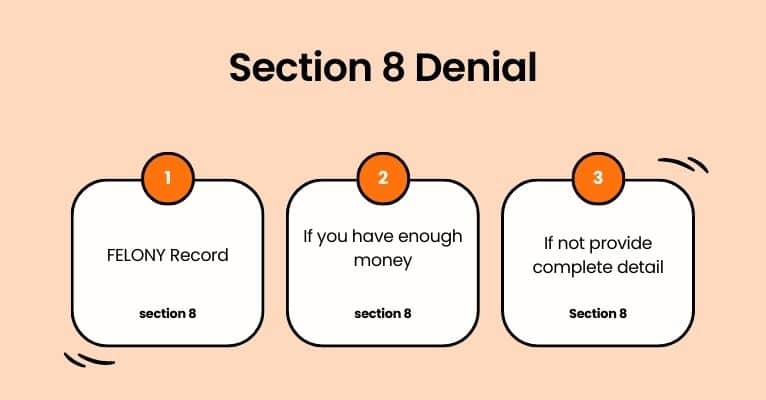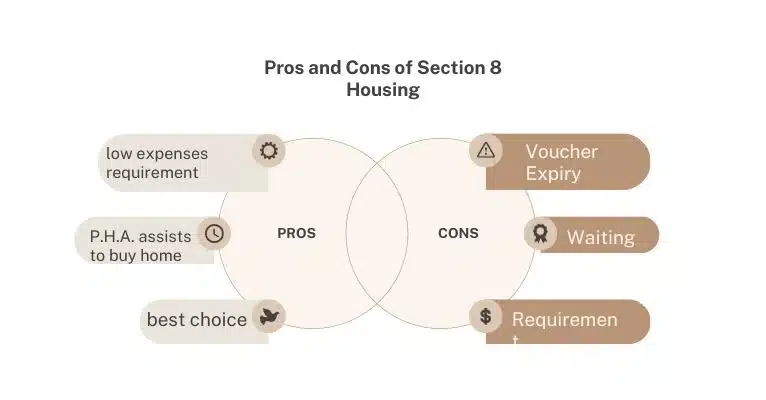Section 8 Housing is a significant relief for low-income families struggling to pay rent, especially during soaring inflation. If you qualify, you get a voucher from the federal government that allows you to pay a tiny portion of your rent as the P.H.A., i.e., public housing agency, will deliver the big chunk. But before that, some criteria must be met to qualify for the homeownership voucher. Let’s explore to understand the eligibility criteria and how the application process works.
Section 8 Housing
What is the Housing Program, and how does it work?
This is a federal program established in 1974, designed to provide subsidized housing for low and moderate-income families. It is also known as the Housing Choice Voucher program. The Housing Voucher program assists families who struggle to pay their rent, i.e., the issued voucher covers the maximum cost of the landlord’s rent, thus helping families to have a roof over their heads.
The program aims to offer affordable housing choices within a low budget, and it facilitated over 5 million people in paying their rent in 2018. There is an income criteria that you must meet, i.e., you should be earning at or less than 80 % of area median income levels. In addition, the voucher applicants are required to qualify as a family (with children) or as elderly or disabled people.
The federal program sends the landlords direct payments via the local housing authorities, thus covering a major or even all of the voucher qualifier’s rent. However, it is important to note not all landlords accept vouchers; therefore, you will need to do thorough research to find the one who does take. There are some churches that also help low-income individuals and families with rent.
What’s The Difference between Section 8 and H.U.D.?

This Section 8 and H.U.D. housing are both housing programs yet distinct from each other owing to the type of housing they offer. In the H.U.D. program, the federal government owns the housing; thus, you will live in a specific location, in the government-owned apartments and duplexes. But being this program voucher holder, you will be able to rent any privately owned residence (with the condition that the landlord does accept the voucher), which is a convenient option for obvious reasons, as it allows you to choose a home near your workplace, or in an area with better education facilities for your kids, i.e., it offers you mobility, unlike H.U.D. program.
By availing Housing voucher, you can live in apartments, condos, duplexes, single-family homes, etc., as long as they are approved by local P.H.A.s, which is a real catch for Housing Choice Voucher program benefits. But H.U.D. has its advantage in terms of income requirements, i.e., you can earn up to 80% of the average income for the area and still apply for H.U.D. and might get it, but for the Section, you must earn less than 50% to be eligible for the voucher.
How do I find out if I should apply for housing?
First, you need to determine your income sources and preferred location. There are many income sources considered by the Housing Choice Voucher program, which are salaries, overtime pay, child support, wages, tips, alimony, pension, welfare, retirement fund, unemployment, social security, veteran benefits, disability, lottery winnings, commission, rental property income, and worker’s compensation.
Moreover, you have to be an eligible immigrant or a U.S. citizen to qualify. You might require documents like a U.S. passport, Green Card, Social Security, and birth certificates for the application process. And yes, you can receive housing assistance even when you are not a citizen, just a person living in the U.S. with an immigration status.
Even though they require your Social Security Number (SSN) during the housing application process, other documentation would do in case of losing your SSN card.
One of the most crucial things that get considered is your criminal history. There are three conditions in which you don’t qualify for eligibility as an applicant, i.e., if you have been registered on the lifelong cheat offender register or have been convicted of producing meth in federal housing. Lastly, if you have ever been evicted for drug-related reasons, your chances of qualifying for the voucher are almost nonexistent.
How to Apply

Follow the steps mentioned below to apply for the Housing Choice Voucher program:
- Search your local housing authority by state, city, and zip code.
- Reach out to your local P.H.A. to determine your eligibility status, i.e., it is based on your A.G.I., aka annual gross income, family size. Of course, your income must be at most 50% of the median income in your area. Remember, the residents or homeless people get preferred over others for obvious reasons.
- Fill out all the required application details, i.e., full household name, SSN, age, gross household income, mailing address, email address, phone number, housing history, and last but not least, any criminal record. Don’t lie about any of these details; otherwise, you will jeopardize your chances of approval and qualification.
- Check your waiting list status, which is supposed to be longer in high-demand areas.
- Start searching for affordable housing within 60 days of using your voucher. Remember to sign a minimum 1-year lease with the landlord, which may require you to go for a security deposit. Now come to the best part: you will have to pay for only 30 % of the monthly income toward rent as the remaining, i.e., the significant chunk, will be paid by P.H.A. directly to the landlord.
What to do while you’re In waitlist?
It is advised by lawyers and former housing authority workers to stay on the waitlist as it helps you remain assured. In addition, keeping a written record of all the communication with the housing authority, including your responses to the notices, is best. Moreover, keep everyone updated on any changes that might occur throughout your journey with this Housing about income, living conditions, household size, etc. You can even join this community online. Remember, patience is the key, as it might take months and even years to get the approval, which highly depends on the demand.
What Happens When Your Application Reaches the Top of the Wait List?
You will get the invitation for an in-person eligibility interview if your application reaches the top of the waitlist, so it’s best to be prepared beforehand to avoid delays. Prepare these required documents to avoid unnecessary glitches:
- The recent bank statements
- All household members above 18 must have a Photo ID
- The birth certificates of the family
- Social security cards
- Retirement award letters
- And lastly, Public assistance award letters.
Then, if you end up making it to the top of the Priority Waitlist, you will be required to provide documents to prove your situation, i.e.,
- To verify your displacement
- To verify your military status
- To prove your disability, i.e., documentation (if you applied as a disabled person)
Take advantage of your scheduled appointment at any cost, as your failure to attend will cost you a disqualification and a lot of hassle as you will need to start from the very first step, i.e., the application stage, all over again. Thus, save yourself from mishaps by preparing all the required documents beforehand to ensure a smooth process.
Recommended to Read: Section 8 Apartment near me
Reasons for Denial

Myriad reasons could be why P.H.A. denies you a Section 8 application in addition to the usual ones, i.e., not having a lawful status in the U.S.U.S., inability to meet the income requirements, etc.
Your application may be rejected based on incomplete information about you or your household members.
However, other reasons could lead to your rejection by P.H.A., i.e., if you and any of your household members:
- Have been evicted from federally sponsored housing within the last five years.
- If you have been found guilty of fraud or bribery concerning government-funded housing programs
- There is a high chance of rejection if you have been terminated from the housing subsidy program.
- It might be because you still need to fulfill your part of the rental agreement.
- If you owe money to any housing authority, you risk rejection.
- And lastly, if you have ever been abusive towards the P.H.A. staff or have behaved in a way considered objectionable.
Even though these disqualifying factors may vary, you should know them beforehand. Know have you heard the phrase? “Better late than sorry”
Can You Appeal on Denial?
Yes, you can appeal by scheduling an informal hearing within the deadline, as the P.H.A. is under obligation to delay termination until the hearing. Gather all your supporting documents that might help you or strengthen your case, i.e., complaints, lease contracts, damage claims, repayment agreements, police reports, etc.
You can even consult P.H.A. or your lawyer to guide you through all the necessary documents. A third-party individual coordinates the informal hearing and makes a final decision after considering all the gathered evidence, the rules, and both sides of the story. If you prove your eligibility, the denial will be dropped. You can even choose to bring a legal representative with you to the informal hearing.
Applying with Multiple P.H.A.s
If you want to expedite securing a program voucher, apply to multiple P.H.A.s simultaneously, as it is legal and saves you a lot of waiting time. Keep in mind that waiting lists can be super long, costing you three years or longer; hence, going for multiple applications at a time allows you to settle for the faster option available, which is a highly advisable step since few P.H.A.s even stop accepting applications to manage the one they already have.
Pros and Cons

This Housing section offers rental assistance to qualified individuals after screening them through a lengthy and in-depth application process. However, it comes with a 15-year housing assistance limit, i.e., limiting vouchers for half of a 30-year mortgage term.
Pros
- Your housing expense requirement is low: The qualified applicants must only pay 30% of their adjusted monthly income toward housing expenses, which is a steal in this economy.
- You’ll have more access to properties: One of the major perks of Housing Law is having more access to better homes and choosing the one that suits your income, lifestyle, needs, facilities, etc.
- You’ll have help from P.H.A.: Your local P.H.A. assists you through home-buying.
Cons
- Your voucher will expire: The Program Voucher support ends after 15 or 10 years, in case your mortgage terms are less than 20.
- You could have a long wait: The wait is directly proportional to the demand, so if there is high demand for a Housing Voucher, it could take months and even years to qualify for the voucher.
FAQs
Can College Students Qualify for Housing Vouchers?
College students above 24 can receive housing assistance if they are:
- A veteran of the U.S.U.S. military,
- Married
- A parent (of a dependent child.)
Such students do not meet all other eligibility criteria. It must be noted that college students under 24 can also qualify for the voucher if they are married, a parent of a dependent child, or a veteran, along with the requirement of proving they are living independently for a minimum of 12 months.
Can a Felon Get an Emergency Housing Subsidy?
If you meet all the general requirements, being a felon or having one as a household member does not hinder your eligibility, especially in a particular condition, i.e., an emergency. However, if it has been less than five years since you committed the crime, then there is a minimum or no chance of you getting a Housing voucher.
What sort of Felonies end up disqualifying you from The program?
There is a chance of you losing your eligibility for Section 8 housing indefinitely if you or your family member has been convicted of these felonies:
- Drug-related felonies, e.g., Meth production and selling in housing areas
- Violent crimes, a special mention to crimes against children
- Sexual assault or rape (If you got listed on sex offender register)
- Possession of Illegal weapons
How to Apply for Emergency
Meet the mentioned eligibility criteria and submit the standard application, including all the necessary information to support your emergency, i.e., age, disability, abuse, homelessness, etc. It is the job of P.H.A., aka Public Housing Authority, to determine your eligibility for the priority waitlist by reviewing your application and all the supporting documents. You can increase your chances of getting help by contacting a P.H.A. official to explain the severity of your case. You might get placed on the regular waitlist because you failed to prove your emergency, so don’t wait silently.
How much time it usually takes for the application to get accepted?
It depends on the time; the higher the demand for Housing Vouchers, the more time it will take to accept the application. In addition, there is a designated criteria of priority, i.e., the homeless, elderly, disabled, or the people who have been abused are usually preferred first. In addition, the number of applicants and the locations also influence the application acceptance time. The waiting list may even vary from city to city. So be patient; if you have an emergency, remember to mention it in your application. You should also reach out to a P.H.A. official to explain the situation. Once you get to the top of the waiting list, the housing authority will warn you to start looking for a landlord who accepts housing vouchers.
Can I access this with no job?
The best approach to keep receiving the benefits is to keep the P.H.A. in the loop about everything. Yes, you will be required to pay a particular portion of your rent, but you must let them know if your income situation changes because of losing or quitting a job. You may get rent payment adjustments by explaining your situation honestly.
Remember, you would never want to lie to P.H.A., as dishonesty might cost you your voucher support. Moreover, if you receive a regular unemployment check, that accounts for income and has to be reported to the P.H.A. Even though the P.H.A. excludes temporary and non-recurring benefits, it is better to keep them informed.
Does This Section Also assist in terms of Utilities?
Yes, it does support individuals with extremely low or zero income by providing utility allowance, which is based on an eligibility calculation done by P.H.A. and aims at covering your expenses reasonably, i.e., excluding excessive bills. You will have to cover the difference yourself if you exceed the allowance. However, you should know you do not qualify for a utility allowance if your landlord pays for the entire building.
What Utilities Will Section 8 Help Me Pay For?
Utilities, i.e.,
- Electricity
- Gas
- Sewer
- Rental of a kitchen range, microwave, and refrigerator
- Heating fuel
- Trash collection
- Water
Note, the bills for cable television, telephones, and internet services, having considered amenities, are not covered by utility allowance.
How Much Is My Utility Allowance on This Law, and Am I Receiving Any?
Check your lease or income recertification paperwork filed yearly to see if the utility allowance is stated there. You can even request your landlord or P.H.A. for your Utility Allowance amount to find out the amount you receive under Utility Allowance or see if you do.
Does Utility Allowance adjust for disabled individuals?
Yes, you may qualify for a higher Utility Allowance if you or any household member has unique needs. For example, you could receive more allowance to cover the extra electrical expenses due to the medical equipment that consumes more electricity, e.g., oxygen concentrator, asthma nebulizer, etc.
How Long Can Somebody Stay With You in the Housing Section?
As per law, you can have someone stay with you for more than 14 days (not indefinitely). You may have a time limit stated on your lease, which can jeopardize your subsidy in case of violation.
What sort of income is not included?
There are specific income sources that are generally excluded from the calculated household income calculations in this law, i.e., EITC (Earned Income Tax Credit), T.A.N.F., S.S.I., health and accident insurance, healthcare expenses, reparation payments paid, foreign government payments, childcare expenses, few capital gains, federal statute provisions, and the income of foster children and child support costs.
Can I transfer the housing voucher To another Family Member?
Yes, it is transferrable. However, the family member must adhere to certain eligibility criteria to get the authority’s approval. They have to fulfill the following eligibility criteria:
- Eligible U.S. citizen
- With income not exceeding the voucher’s owner
- They must be living with you
- Their name must be listed on the lease agreement and detailed as a co-head of the household.
- The voucher also transfers to the family member upon the death of the voucher owner.
What is the Ruling On Getting Married To A Felon?
You can marry a felon and get the Voucher as long as your spouse has no charges against them as a sexual offender or drug trafficker. However, you must report your partner’s felony before marriage and the type of crime he committed to seek the approval of the housing authority.
How Long Does It Take To Transfer To Another Family Member?
It may take weeks or sometimes a few months for the transfer to happen as the local housing authority is up against verifying a person’s eligibility by going through all the submitted documents and forms. The process can be time-consuming if the submitted papers are not correct.
Can I Remove Someone from my Voucher?
You can contact your local housing authority to remove someone from the voucher and must submit a written form underlining the housing choice voucher program change. You might have to file a report as well. Nevertheless, the local housing authority will keep you in the loop with updates about the procedure.
What is The Age Requirement?
Yes, it does. You must be at least 18 years old or older than that to apply for housing assistance, as 18 is the legal age for emancipation.
Is Section 8 Allow Pets?
Yes, but not all pets are allowed.
Summing it Up
If you are looking for affordable housing, Section 8 Housing might be the answer, as it provides clean, safe, affordable housing to families with a budget. The federal program aims to provide rental income so the benefits can utilize the homeownership voucher program funds to invest in a home. It takes a long time to qualify for the program, and you might even stay on the waiting list for years, so you might also want to consider other options. It is recommended to apply to all the available schemes simultaneously and to go for the faster option.

